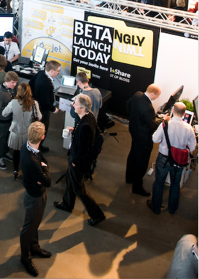 Over the past few days at the Next Web conference in Amsterdam, I had the opportunity to hang out with about 700 Internet entrepreneurs from all over Europe. The startup scene in Europe reminds me of Silicon Valley four or five years ago—hungry startups building Web companies on the cheap and products that scratch a personal itch.
Over the past few days at the Next Web conference in Amsterdam, I had the opportunity to hang out with about 700 Internet entrepreneurs from all over Europe. The startup scene in Europe reminds me of Silicon Valley four or five years ago—hungry startups building Web companies on the cheap and products that scratch a personal itch.
Swedish startup Twingly, for instance, wants to come up with spam-free blog search by starting with the best 450,000 blogs and letting users share blog posts with each other. ParisBrussels-based Zilok is creating an eBay for renting things such as drills and digital projectors. London’s Fav.or.it makes a feed reader with extra powers—you can leave comments on blogs within the reader, it ranks posts based on how much they are actually read, and it lets you filter posts by tag, rank, or category. In Munich, andUnite has created a service that allows you to collect your search terms and share them with others.
And a handful of companies are even gaining substantial traction. I was surprised to learn that the social network Netlog claims 30 million unique visitors and four billion page views per month (comScore counts 11 million visitors, but five billion page views). Netlog operates in 15 different languages, and 20 countries. Then there is eBuddy, the Meebo of Europe, which boasts 12 million Web users and 1.6 million mobile users of its Web-based instant-messaging service.
Most of the startups I encountered, however, are still operating under the radar—in Romania, Sweden, Holland, Ireland, France. But a cross-border Web 2.0 culture is definitely gaining steam across Europe. Technology itself is helping to break down borders. A VC showed me the landing page on his mobile phone. It wasn’t his e-mail. It was Twitter. Another startup founder told me that Twitter helps him keep a dialogue going with other entrepreneurs and VCs across Europe, and even with contacts in the U.S.
Europe is still a mosaic of employment law, tax regulations, and cultural habits that can influence where it makes the most sense to locate different parts of a business. One Dutch CEO, for instance, told me that it costs you need a minimum of 18,000 Euros in starting capital just to incorporate in the Netherlands. And that is just the government’s fee.
When I asked which region was most likely to emerge as Europe’s Silicon Valley, the answers were all over the map: London, Munich, Berlin, Zurich, Geneva, even Barcelona. The money is in London, cheap office space is in Berlin, the mobile expertise is in Helsinki, the weather’s nice in Barcelona, and the inexpensive engineers are in Estonia (which may not even consider itself part of Europe, but is close enough to manage from Berlin or Amsterdam).
As Europe searches for its Silicon Valley, it may turn up as a state of mind rather than a specific place. The truth is that Europe may not need a single Silicon Valley because business is becoming so distributed. While some Silicon-Valley chauvinists may disagree, the idea of concentrating all the talent and capital in one region seems so last century to many Euro 2.0 entrepreneurs.
(Photo © Pieter Baert).